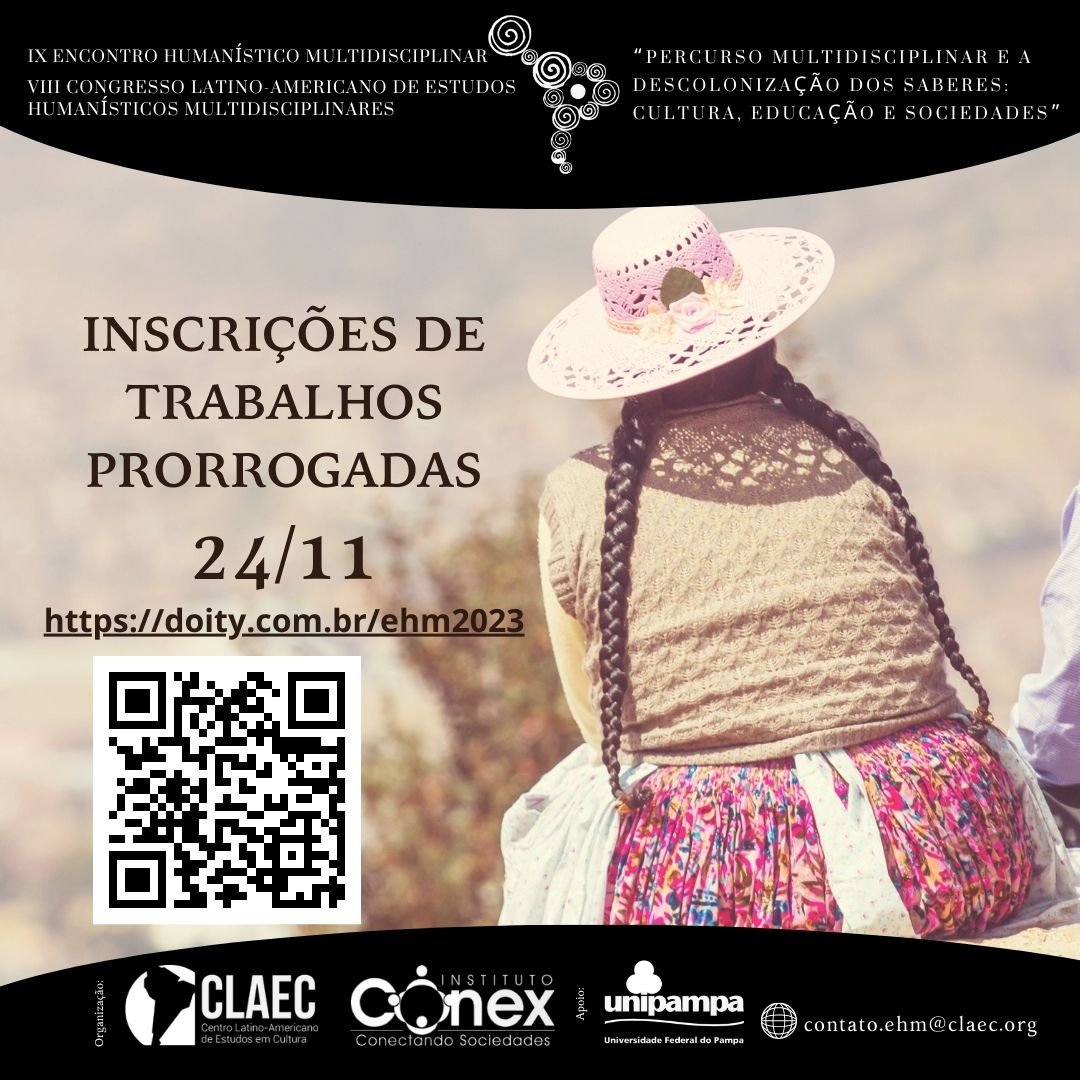Dranda. Priscila Chagas Oliveira (UFPEL)
Dra. Daniele Borges Bezerra (UFPEL)
Dr. João Fernando Igansi Nunes (UFPEL)
RESUMO
O advento da cultura digital e das tecnologias computacionais fez emergir um processo sociocultural de integração da vida social com a tecnologia (LÉVY, 1999; LEMOS, 2007). O ciberespaço, novo espaço representacional de dados, torna-se habitável e habitado por diferentes sujeitos que ali se relacionam, produzem e consomem conteúdos, compartilhando suas trajetórias. Presenciamos não só a hibridização dos meios, das linguagens e das narrativas (SANTAELLA, 2003), mas a sua convergência: mídias outrora offline convergem com mídias digitais online, tornamo-nos seres cíbridos (BEIGUELMAN, 2010). Essa conjuntura contemporânea, ao mesmo tempo em que causa um sentimento eufórico, associado às virtualidades das tecnologias digitais em estado de expansão constante, gera receios e críticas à cultura do eu (self), aos comportamentos cada vez mais fluidos e as relações cada vez mais efêmeras (TURKLE, 2011). O fato é que a cultura digital consolida-se dia após dia, e não há como desprezar os seus impactos sociais, políticos e culturais. Como consequência, vê-se surgir uma cultura da memória, marcada pela inscrição do eu (self) nas redes sociais, através de narrativas “verbo-visuais” (BRUNO, 2007), que têm como diferencial o caráter ubíquo das interações. Essa nova forma de interação social que permite registrar e transmitir experiências por meio de narrativas híbridas, criadas ou transpostas para o universo digital, nos permite atualizar o pensamento de Walter Benjamin, com relação a uma questão que lhe foi tão cara em suas críticas à modernidade. Para o autor o “ofício do narrador” (BENJAMIN, 1987) como um meio de transmissão “de boca em boca” (idem), encontraria sua ruína na modernidade, no entanto, seria fortuito considerar que o surgimento dos meios de “reprodutibilidade técnica” (idem), também criaram outros suportes para a memória, ampliando as formas de transmissão. Seria, portanto, tempo de compreender as narrativas, sejam elas visuais, verbais, sonoras ou híbridas, no contexto em que são formuladas, como reflexo dos recursos e das relações estabelecidas no tempo presente, não como ruína, mas como desdobramento de um modo de fazer, que segue pautado na lógica da transmissão, agora por meio do compartilhamento em rede. Uma forma de “salvar pela cópia” (QUARANTA, 2014). Deste modo, este simpósio temático acolhe trabalhos que abordem os desafios e possibilidades descortinados pela cultura digital, sobretudo no que se refere às novas subjetividades instauradas pela relação humano-máquina no âmbito das narrativas visuais, verbais, sonoras, hipertexto, testemunhos, entre outros. O objetivo é reunir pesquisas multidisciplinares que contemplem em suas propostas a compreensão desta dinâmica social emergente, fomentando, simultaneamente, novas questões que possam evidenciar as profundas alterações introduzidas pelos processos de criação, gestão e transmissão das memórias por meio de narrativas online.
Palavras-Chave: cultura digital; tecnologias digitais; narrativas híbridas; memórias em processo; relação humano-máquina
Digital culture and hybrid narratives: the memory in process
ABSTRACT
The advent of digital culture and computational technologies has emerged a sociocultural process of integrating of social life with technology (LÉVY, 1999; LEMOS, 2007). Cyberspace, a new representational space for data, becomes inhabitable and inhabited by different individuals who interact, produce and consume content, sharing their trajectories. We see not only the hybridization of media, languages and narratives (SANTAELLA, 2003), but their convergence: offline media converge with online digital media, we become cybrid individuals (BEIGUELMAN, 2010). This contemporary time, while causing a euphoric feeling associated with the virtualities of digital technologies in a state of constant expansion, generates fears and critiques of the culture of “self”, increasingly fluid behaviors and the ephemerality of relations (TURKLE, 2011). The fact is that digital culture is consolidates day by day, and there is no denying its social, political and cultural impacts. As a consequence, a culture of memory emerges, marked by the inscription of the self in the social networks, through “verbo-visual” narratives (BRUNO, 2007), whose differential is the ubiquitous nature of interactions. This new form of social interaction, that allows us to record and transmit experiences through hybrid narratives, created or transposed to the digital universe, allows us to update the thinking of Walter Benjamin, an issue that was so expensive in his criticisms of modernity. For the author, the “office of the narrator” (BENJAMIN, 1987) as a means of “word of mouth” transmission (idem), would find its ruin in modernity, however, it would be fortuitous to consider that the emergence of the means of “technical reproducibility “(Idem), also created other supports for memory, expanding the forms of transmission. It would, therefore, be time to understand the narratives, whether visual, verbal, sonorous or hybrid, in the context in which they are formulated, as a reflection of the resources and relationships established in the present time, not as a ruin, but as an unfolding of a mode of do, which follows the logic of the transmission, now through network sharing. A way to “save by copy” (QUARANTA, 2014). In this way, this thematic symposium welcomes works that address the challenges and possibilities unveiled by the digital culture, especially with regard to the new subjectivities established by the human-machine relationship in the scope of visual narratives, verbal, sound, hypertext, testimonies, among others. The objective is to bring together multidisciplinary researches that contemplate in their proposals the understanding of this emerging social dynamics, simultaneously fostering new questions that can highlight the profound changes introduced by the processes of creation, management and transmission of memories through online narratives.
Keyword: digital culture; digital technologies; hybrid narratives; in-process memories; human-machine relationship
